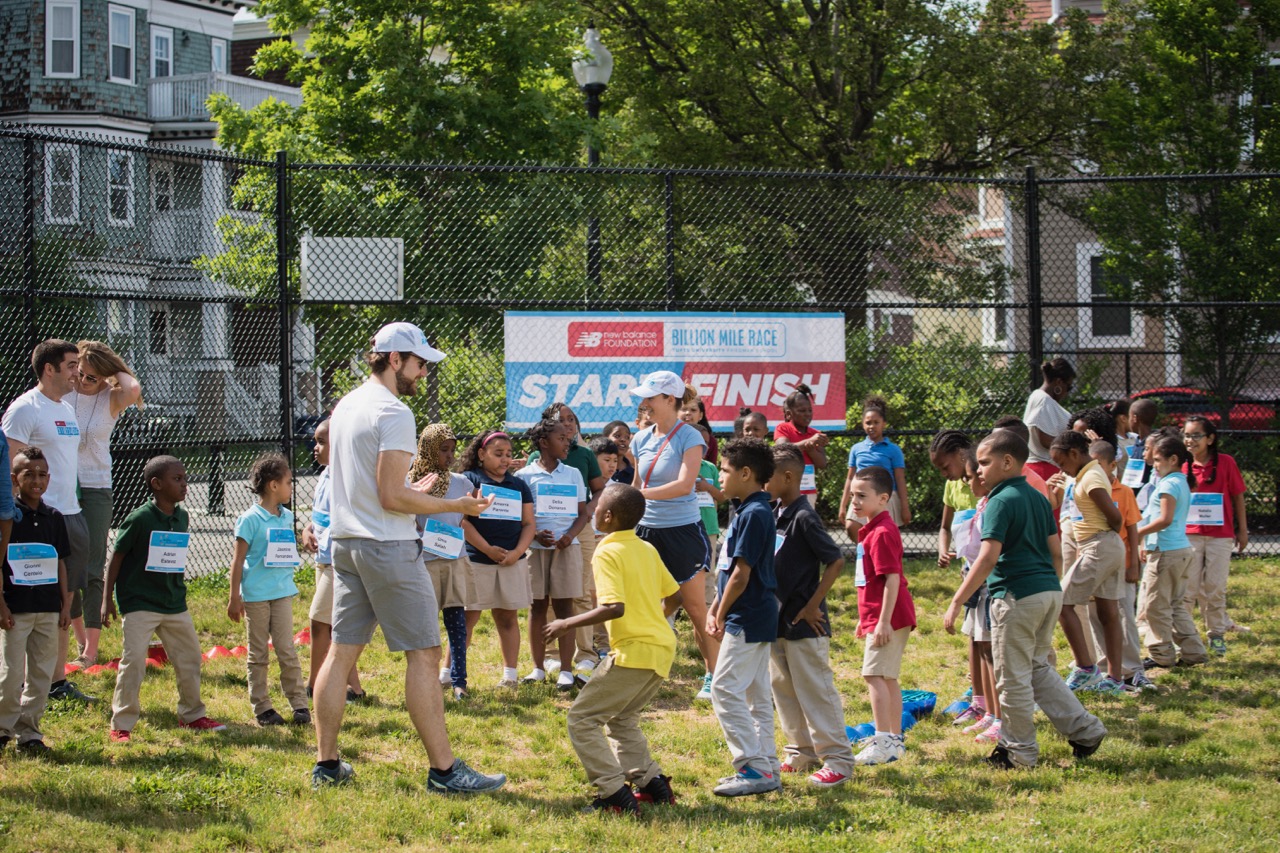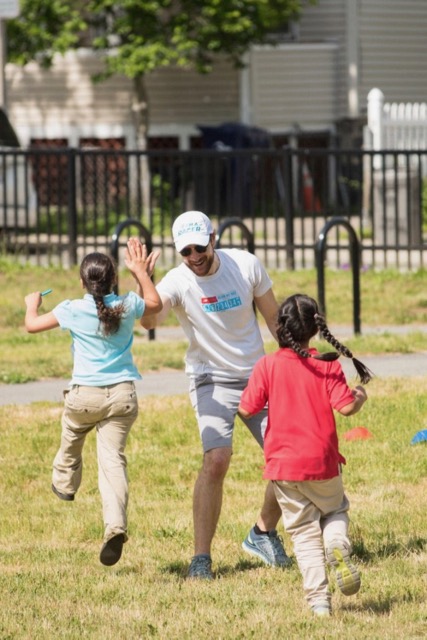Grantee Profile: ChildObesity180
Getting kids up and moving is the goal of ChildObesity180, using running at its core
Q and A with Daniel J. Schultz of the Active Schools Acceleration Project
Editor Note: We are looking at some of the youth physical activity partners in our Health and Wellness Strategy in honor of National Physical Fitness and Sports Month.
This time, we look at ChildObesity180, which supports the founding and expansion of free walking and running clubs at Boston schools and community centers. The Boston Foundation has funded the effort since 2014. Active Schools Acceleration Project Manager Daniel Schultz explains more about the work.
First, can you give us a basic overview of what your program looks like in Boston area schools?
For almost four years, ChildObesity180 has helped PE teachers, classroom educators, after-school program staff, and parents start free walking/running clubs at public schools and community centers across Boston. We work with our coaches to use the program to increase incremental physical activity throughout the school day. In addition to boosting activity, clubs also help instill confidence, social connectedness, goal setting, and self-esteem.
The majority of our sites are elementary schools, but we also support some middle and high schools. Our program reach has grown from 20 schools and 1,200 students in the 2014-15 school year to 71 schools, 10 community programs, and over 8,000 students participating in 2017-18. Most of our run clubs are located in the neighborhoods of Roxbury, Dorchester, East Boston, and Mattapan. Clubs located at schools also participate in our larger national campaign, the New Balance Foundation Billion Mile Race, an initiative that challenges schools across the nation to walk and run one billion miles collectively.
Say we walk into your program in action. What do we see happening?
We’ve learned that no one-size-fits-all strategy works to increase physical activity at school, and we help each coach find the right approach that works for their goals, facilities, and resources.
In light of that, it’s unsurprising that programming looks different from one school to the next. Parent coaches like Susan Fields at Ellis Mendell Elementary in Jamaica Plain start the school day by offering club sessions before the bell rings by running laps at White Stadium to train for their “Mendell Mile” community event. Classroom educators like Mery Faial Zaynoune at Orchard Gardens in Roxbury use activity breaks and 20-minute run club sessions during enrichment time to help students improve their focus in the classroom. After-school program staff like Charles Armstrong-Hicks at the Yawkey Boys & Girls Club tailor the program to a middle-school age level by organizing a 5K club that has participants train for local races like the Playworks Run for Recess.
Coaches set up different systems to track students’ activity and help students set and pursue achievable mileage goals. Group mileage goals are also set for the entire club to create a team environment, and progress towards those goals is tracked on the school’s Billion Mile Race profile.
Throughout the program, students are encouraged to challenge themselves and focus on self-improvement rather than competing against others. Students receive small incentives such as colored “runbands” and certificates to celebrate achievements.
If you visited some run club sites this spring, you will also see fun run events. These events provide an opportunity for family members to walk/run with students and to celebrate the club’s hard work. Haynes Early Education Center in Roxbury is hosting their third annual 5K this June, which challenges families to complete 35 laps around their track, which then makes them eligible for prizes. Other sites like Mildred Avenue K-8 in Mattapan are challenging the entire student body to walk/run 1,000 miles as a healthy fundraiser.
Each year, we are impressed and inspired by the dedication and ingenuity of our coaches. We feel lucky to have a partnership so many amazing Bostonians.
How do you design your programs to be inclusive of all students and schools?
One reason we’re passionate about promoting walking/running clubs is that they allow all students to participate. Our dedicated coaches strive to make their programs inclusive of all students, regardless of needs or abilities. Walking/running is also an activity that is reproducible for students outside of club time, and ideally something they continue to participate in the rest of their lives.
We’ve learned that run clubs are particularly amenable to widespread adoption across schools since they require limited equipment, facilities, or training; they can occur at diverse times throughout the school day; and overall program costs per student are relatively low. We provide all our sites free access to our program resources, helping coaches to sustain their clubs year over year.
Tell us about some of your recent successes.
In addition to the generous support we receive from TBF, we’ve been fortunate to build partnerships with other organizations. Some of our recent successes involve support from partnerships that have enabled us to provide additional resources to our run club sites. Thanks to a generous donation from RecycleHealth, an organization that provides free activity trackers to undeserved communities, all our coaches received a brand-new Fossil activity tracker this school year to help them track activity during club sessions. Other partnerships include over $13,000 worth of running shoe donations from Good Sports, an organization that provides free sports equipment to schools and community organizations; this donation helped ensure club members had appropriate footwear at 15 sites. Boston Road Runners, a community-based running organization, has also been generously donated their race equipment to support two school fun run events.
What do you see as the biggest opportunity for your organization heading into the next school year?
In addition to sustaining our program reach, we’re exploring opportunities to help our sites objectively assess the levels of physical activity that kids are getting through club participation. Currently, coaches report their estimates of physical activity contributed from the run club in our annual survey, and they also track mileage totals for their students. Next year, we’re interested in helping sites use devices like pedometers to help them understand child-level activity patterns and to evaluate how different program structures, activities, and other factors influence kids’ overall activity levels.
What’s your long-term vision of success?
Our ideal long-term vision of success is that youth all across Boston have a positive connection to walking and running and build a foundation that helps them be physically active for life. Too often, people have a negative connotation with running that started in childhood, and many students still grow up associating the activity as a form of punishment. This is why we care about creating supportive and fun experiences for students.
In the end, we hope our work helps coaches and students recognize that running is fun and that anyone, regardless of ability or other personal factors, can be runner.
To learn more about ChildObesity180, visit ChildObesity180.org, and if you saw the mention of the Playworks Run for Recess, that event is taking place Sunday, May 19 at the Franklin Park Playstead Field in Boston. Learn more or donate by clicking here.



